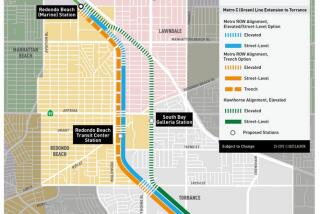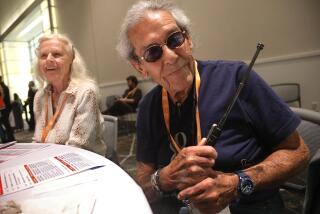Training Their Thoughts on a Night’s Rest
- Share via
As an old country boy, there’s nothing I like better than the sound of the ol’ steel wheels, especially about, oh, 2, 3 in the morning. How comforting to be awakened from a good night’s sleep by the clackety-clack of the rails and the bone-jarring, nerve-racking wail of the train whistle--secure in the knowledge our nation’s goods are on their way to market.
Richard Nixon felt exactly the same way. He grew up in Yorba Linda and wrote in his autobiography that the sound of the trains was “the sweetest music I ever heard.” In later years, he longed for those sounds.
If train music was good enough for Richard Nixon 80 years ago, why not the people of Placentia, who just so happen to live next door to Yorba Linda?
This may be the appropriate time to interject that I haven’t lived near railroad tracks for years and am awakened every morning at 8 by soft jazz on the radio.
Still . . .
What’s with Placentia? Who do they think they are--Irvine?
Let’s get tough, people!
I’m writing this in advance of Tuesday night’s City Council meeting, at which angry Placentians are expected to give an earful to the council and any Burlington Northern & Santa Fe Railway officials foolish enough to show up.
Since Sunday, the railroad ended a long-standing policy of not sounding train whistles as its trains roared through Placentia. The whistles, which can come at any time of the day or night, have riled residents, some of whom haven’t appreciated unscheduled 3 a.m. wake-up calls.
A city official, girding late Tuesday afternoon for the arrival of sleep-deprived constituents at the council meeting, says a few hundred calls have come in. Only one person claims to like the train’s sound--and that was someone living on the Anaheim side of the tracks.
Natives Are Rest-less
“Trust me,” says the city’s management analyst, Kris Gundel. “There’s no humor in it. Since 1986, we’ve been on borrowed time.”
That was the year the state attorney general’s office said cities couldn’t get waivers from rules saying trains had to sound their warning whistles when approaching crossings. The AG’s office did that because a number of other cities began asking for the “quiet zone” exemption that Placentia had enjoyed at its 11 street crossings since 1976.
Burlington spokeswoman Lena Kent sympathizes, but says various factors, including a lawsuit filed following a fatal car-train accident in Placentia in 1998, led to the end of the waiver.
Until now, Burlington had respected Placentia’s quiet zone.
“We let a sleeping community sleep, basically,” Kent says.
No more. Now, the natives are waking up and, boy, are they restless.
Kent says Burlington’s freights don’t run on regular schedules, so she can’t say at what hours the whistles will wail. However, the trains run seven days a week and around the clock, she notes.
That’s the kind of news that will buoy Placentia residents. It’ll be like going to sleep every night with a dripping faucet in the next room--only magnified a few hundred times and accompanied by a high-pitched mournful whine.
No one sees a short-term solution. Burlington and the city are intent on ending the sound of silence at the crossings. In the months and years ahead, Kent says, the city can do things to improve safety and, ultimately, once again make the whistle warnings a thing of the past.
But in the meantime . . .
I suggest Placentians hunker down. This is a simple test of mind over matter.
Rather than thinking of the ear-splitting train whistle as something that makes you sit bolt upright in your bed at 3 in the morning, think of it as a movement from a string quartet.
Violins and cellos. That’s right, think of it as a lullaby.
A little night music.
*
Dana Parsons’ column appears Wednesdays, Fridays and Sundays. Readers may reach Parsons by calling (714) 966-7821 or by writing to him at The Times’ Orange County edition, 1375 Sunflower Ave., Costa Mesa, CA 92626, or by e-mail to [email protected].
More to Read
Sign up for Essential California
The most important California stories and recommendations in your inbox every morning.
You may occasionally receive promotional content from the Los Angeles Times.










